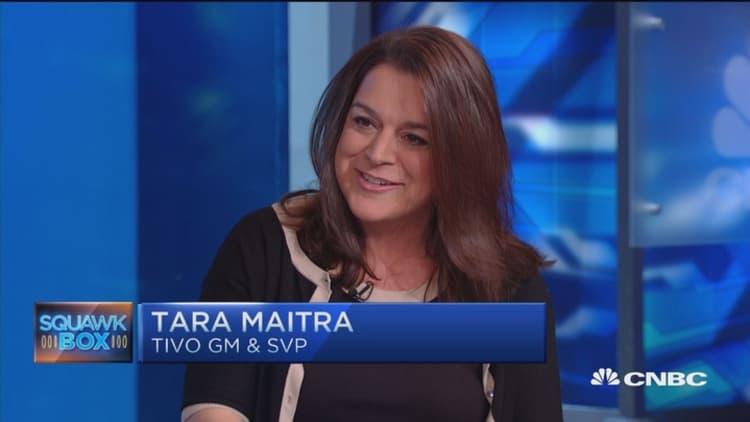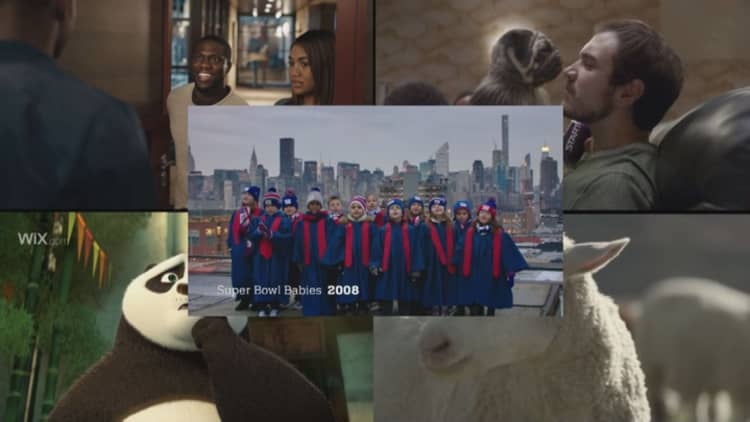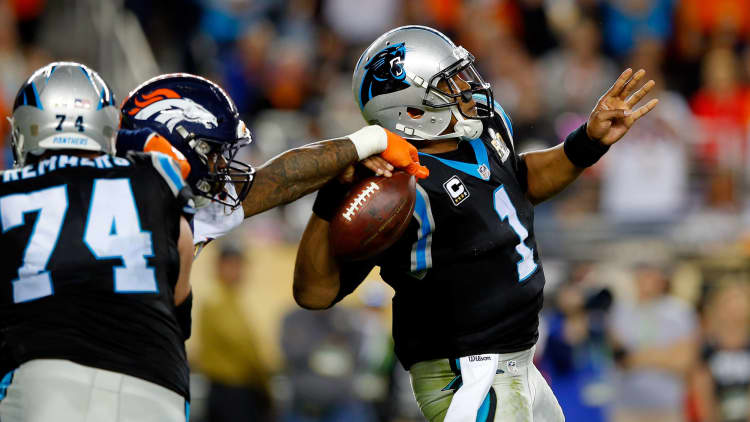


One of the most talked about brands on Sunday wasn't an official Super Bowl advertiser. Esurance, which opted to run pregame and postgame TV advertisements coupled with a strong social media campaign, dominated the conversation on Twitter.
"We wanted to leverage second-screen culture," said Sarah Evans, Esurance social media communications specialist. "No one these days is just watching the TV. We're surrounded by technology. We know the only way into somebody's house, into somebody's life, is not just through the TV screen, but through handheld devices and social media."
Social intelligence platform Sysomos saw that Esurance had the most Twitter mentions during the Super Bowl with a 100 percent favorable tweet rate, followed by Doritos and Budweiser. When it came to branded hashtags, #esurancesweepstakes had nearly 2 million mentions. #Pepsihalftime and #puppymonkeybaby rounded out the top three.
The tally from analytics platform Amobee Brand Intelligence also showed that Esurance dominated the conversation during the Super Bowl on Twitter, with more than 835,000 tweets about the company. Doritos,Pepsi, Mountain Dew and T-Mobile filled out the top five on its list.
Social software program Spredfast found that some of the top most mentioned topics on Twitter during the game weren't direct advertisers. It found 2.6 million tweets about Beyonce and 1.1 million tweets about the Broncos.
What made Esurance's Super Bowl ad campaign stand out was that it was one of the only companies to hold a contest this year. It gave away a little more than $1 million to 17 people. It also leveraged digital media techniques to get viewers involved. To enter the contest, it asked Twitter users to retweet its tweets further spreading brand awareness. It also tried to react in real time, including posting videos where it face-timed with winners soon after they notified they won cash prizes.
"We approached the Super Bowl the way we approach our insurance: modern, effective and innovative," said Nancy Abraham, Esurance vice president of integrated marketing communications.
Mountain Dew, which also had a much talked about commercial with its "puppymonkeybaby" creature. The topic trended on Twitter throughout the game. Although Amobee found that most of the social conversations around the hashtag were negative, both the brand and Sysomos said chatter was mostly positive.
"Some of the past Super Bowl spots that have done really well have had a puppy or a baby," said Sadira Furlow, director of brand marketing for Mountain Dew. "Consumers love animals in general. We were really look for a way to draw awareness to Mountain Dew Kickstart."
Furlow said the company predicted that the commercial would trend online, so it was prepared with a social media strategy of puppymonkeybaby clips and GIFs to post online. About half of the tweets were planned, with the other half custom content posted in response to key online influencers who were tweeting about their ad. The team huddled in a social media "war room" throughout the game.
"We're not responding to the negativity," she said. "Eighty percent of the conversation is positive or neutral. It is trending because of interest and intrigue."
Advertising agency Warschawski CEO David Warschawski pointed out that Mountain Dew's ad connected with its target demographic of young men. He said the strategy was smart to combine three things people usually love in Super Bowl commercials, and use the wacky concept to reinforce what the company was about.
"Most of the ad trackers or the way people look at advertising today is that they look at it under the lens of if it was great entertainment. Did people like it? But that isn't great advertising. If you're trying to make an emotional connection with a 25-year-old male, your mother shouldn't love that commercial as well. Too many advertisers make everyone love an ad and that isn't the right approach."
The story is a little bit different when you take social media mentions out of the picture. Television analytics company Samba TV determined that the most viewed commercial of the first quarter was from Squarespace, followed by AstraZeneca's opioid induced constipation ad in the second quarter, "Doritos Dogs" in the third, and finally T-Mobile's Hotline Bling spoof in the last quarter.
According to TiVo, which pulled data from 30,000 households, the Doritos "Sonogram" commercial was the most watched ad, followed by Mountain Dew's "PuppyMonkeyBaby" and the Taco Bell "Bigger Than Everything" ad for the Quesalupa.
Read More
As for ads viewed on YouTube, as of early Monday Hyundai's "The Chase" and "First Date" was the most watched and fourth most watched Super Bowl commercials, respectively. Pokemon, MINI USA and Mountain Dew also had strong showings in second, third and fifth place.
While Nielsen tracks Super Bowl ads, it doesn't do pure TV ratings. Instead it uses a combination of social chatter and public opinion to rank them on an "ad and brand memorability index." As of publication Monday morning, the numbers for this year's Super Bowl were not posted.



